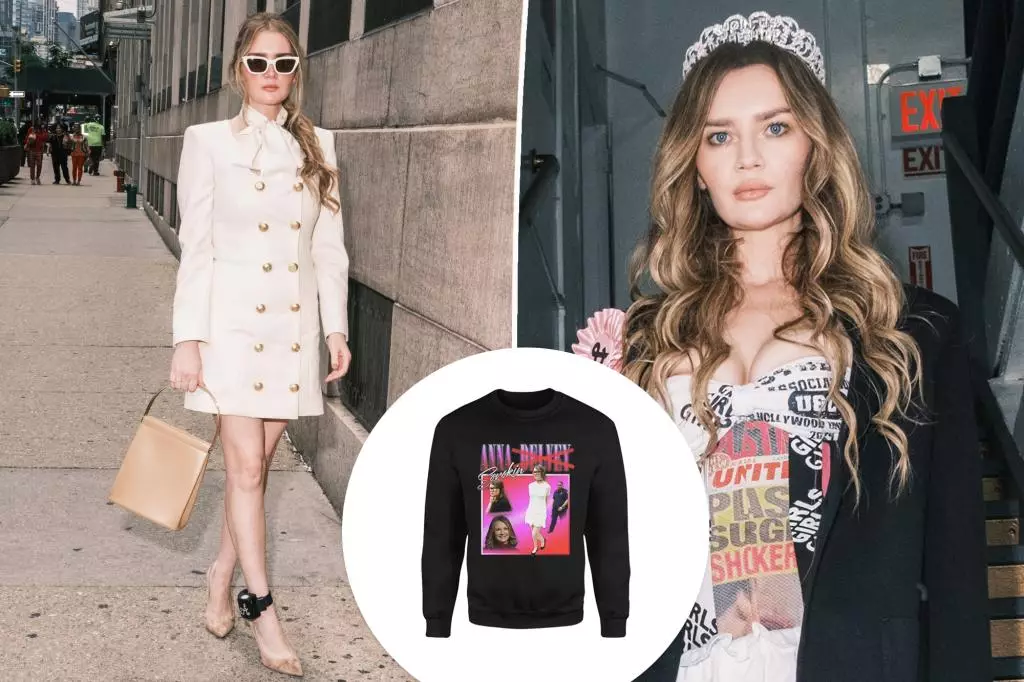Anna Sorokin, widely recognized by her alias Anna Delvey, has become a remarkable figure in contemporary media debate. Once notorious for her elaborate scams that defrauded individuals and businesses out of over $250,000 between 2013 and 2017, Delvey’s narrative is a captivating portrayal of ambition, deception, and resilience. Following her release from prison, where she served time for her fraudulent acts, Delvey has made an impressive transformation, positioning herself as a pioneering force within the fashion industry. By trademarking her criminal alias, she has crafted an opportunity to monetize her past while simultaneously reclaiming her narrative—something that the broader societal context of cancel culture and rehabilitative justice makes particularly pertinent.
Delvey’s transition from an outcast to a sought-after persona illustrates the complex interplay of media representation, public fascination, and the business of identity. This metamorphosis raises important questions about the nature of reinvention in today’s society and whether society is willing to accept reformed characters as legitimate contributors to culture.
Recently, Delvey’s endeavor faced an unexpected hurdle when retail giant Walmart began selling merchandise emblazoned with her name and likeness. In a swift move to protect her business interests, Delvey dispatched a cease-and-desist order to Walmart. The legal documents asserted a clear violation of her trademark rights, which were registered shortly before her release from prison. According to her legal representative, Duncan Levin, the proliferation of these unauthorized products compromises Delvey’s branding efforts and overall reputation.
The trademark registration for “Anna Delvey” encompasses a wide array of apparel items, suggesting that Delvey does not merely seek recognition but aims to build an entire lifestyle brand. This serves as an embodiment of the ‘American Dream’ narrative—a story of overcoming adversity, even if that adversity was, at least in part, of her own making. However, the ethical implications of profiting from a criminal past remain controversial, illustrating the societal divide in how we perceive criminality and celebrity.
Levin’s communication with Walmart stipulated an immediate halt to all sales of Delvey-branded merchandise, giving the corporation a mere 24-hour timeline to comply. Underlying this demand is not just a desire for compliance but a broader discourse about corporate accountability in the face of individual rights. Delvey’s assertion of her rights highlights the challenges faced by celebrities trying to control their narratives in an industry that often commodifies personal stories for mass consumption.
The catalogue of products listed by Walmart demonstrates an unsettling exploitation of Delvey’s infamy, ranging from sweatshirts to t-shirts. By inundating the market with unauthorized merchandise, Walmart risks not only substantial financial repercussions but also a public relations fallout. Such cases illuminate the ongoing struggle between consumer culture and individual agency over artistic and commercial identity.
Practical Implications for Creators and Celebrities
The Anna Sorokin and Walmart situation prompts a larger conversation about brand protection for individuals with complex backgrounds. Rapid technological advancement and the rise of e-commerce have redefined how brands engage with consumers. For creators and personalities navigating similar paths, the importance of establishing and protecting their intellectual property cannot be overstated.
As influencers increasingly blur the lines between personal identity and commercial brand, the stakes have risen significantly. For those like Delvey who have a controversial history, every merchandise launch or public appearance is scrutinized, tested against both past deeds and current market standards.
The Verdict on Fame and Infamy
The tug of war between Anna Delvey and Walmart is emblematic of the complexities of fame in a modern context. As society grapples with the ethics surrounding crime, punishment, and redemption, Delvey’s case serves as a lens through which we can examine broader issues of capitalism and morality. While she seeks to reclaim her narrative from those who would exploit it, the likelihood of successful brand longevity remains uncertain against the backdrop of a public still reeling over the realities of her past misdeeds.
In an age where the public can simultaneously revile and revere figures like Delvey, the outcome of this legal conflict may well determine not just individual fates but also how we define the intersection of crime, culture, and commerce in the years to come. Ultimately, the saga of Anna Delvey encapsulates a remarkable tale of transformation that challenges conventional notions of success and virtue in popular culture.


Leave a Reply